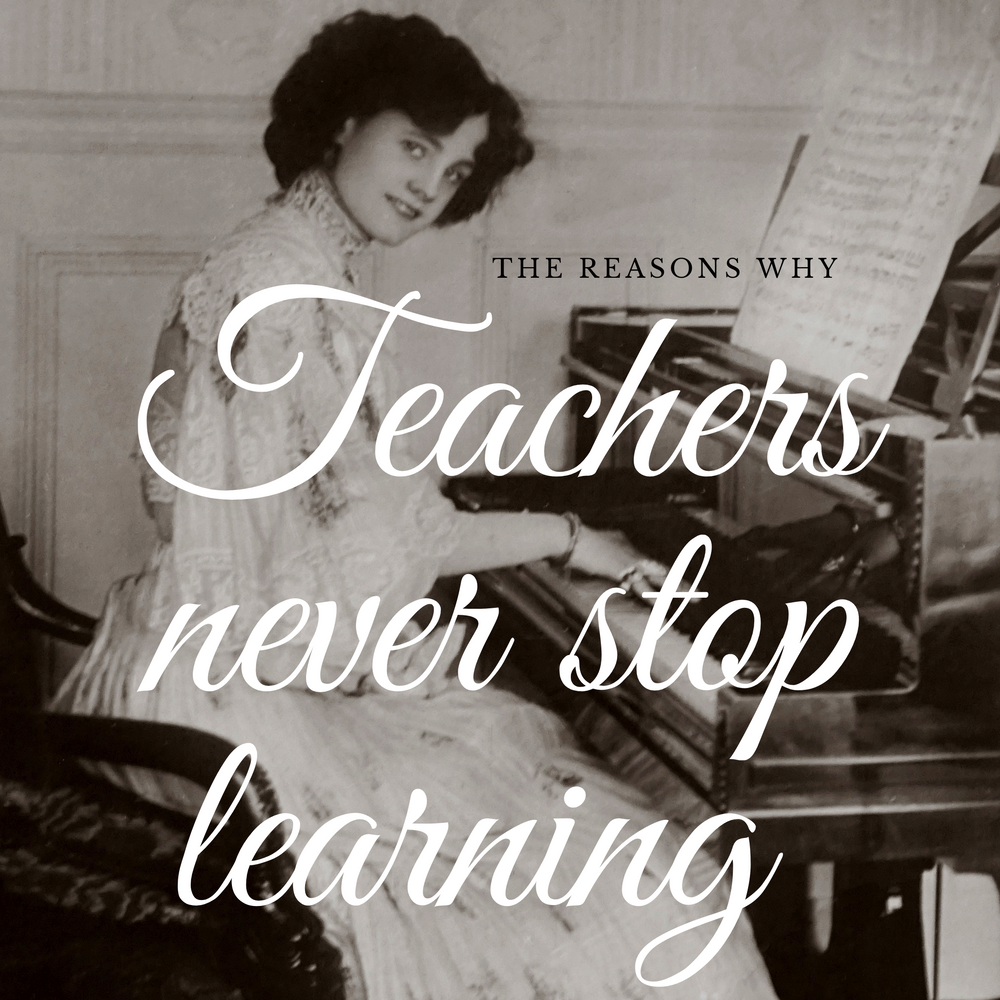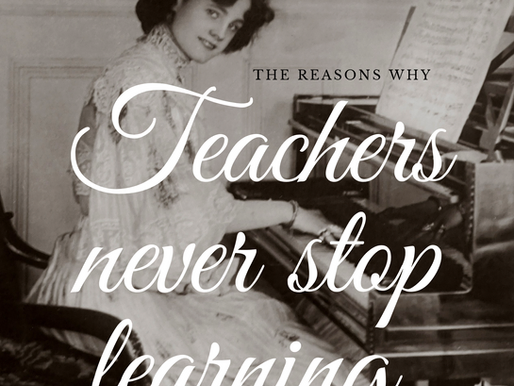Uncategorized
Teachers Always Learning
Teachers Always Learning

The Figure of the Teacher
An enlarged version of a pupil
The teacher, the father figure of an alumn’s professional growth. Many times we as students have seen teachers like a bigger version of ourselves, however with more patience and knowledge. Sometimes, we may encounter our own teachers learning as well.
Nonetheless, teachers can also be pupils!
“Do you still take lessons?”, a question that I hear regularly from students of various ages and skill levels.
This is a common and somewhat understandable misconception when taking music tuition, that the teacher doesn’t need lessons because they are teaching.
They have already done their studying so to speak. However, it is far more common than one would assume, with many teachers taking lessons to branch out into another style or technique, or simply to refine their existing style and technique.
The Teacher’s Role:
Treatise of Harmony by Arnold Schoenberg
According to Schoenberg, the teacher’s role is not to spoon-feed the student and passively wait until the lesson is dismissed, but to collaborate actively within the student’s growth and musical potential.
Schoenberg gave an advanced to his era version of what a real good teacher must be like.
Within the teacher’s training, there is a lot of empathy discussed. The figure of the teacher has to be present but not imponent.
The teacher has to involuntarily establish a personal connection with the pupil and adapt to each student’s necessities.
As Schoenberg suggested, if the pupil can do something without instructions, it is better to let them do so.
This teaching technique allows the student to discover himself the mistakes and possible options to work on a difficult passage.
The teacher has to allow the student to grow outside his comfort zone, however still within a comfortable range of flexibility. The trick is not to overwhelm the student with too many hard activities but with one or two to just challenge the pupil at an intellectual level.
Some student’s mistakes can serve as lessons to the teacher as well, as the teacher observes where the student struggles to work. Giving space and time to the teacher to analyze, correct and play the passage and work with the student later in the latter.
As movement generates searching, the intuition of the student is challenged by practicing this teaching technique. This is the best manner for both participant’s growth when in a lesson.
Necessary Skills
As teachers, we have to admit that we were also once young students who knew little and dreamed of being a star in music. This takes a lot of patience and practice.
Therefore one of the strongest skills a teacher can have is empathy for the student.
Many students are very sensitive humans, therefore a class full of screams, humiliation and strict rules won’t work. We need to have a balance between creativity and discipline.
The basic skills a teacher must develop within the teachers learning resources are:
- Patience
- Organization
- Flexibility (physical and mental)
- Communication
Patience:
All pupils are different and require their specific time and space to learn. There are going to be many moments of desperation with some students, who don’t study, who don’t have the drive to work harder or who get easily distracted.
However, this shouldn’t be a big incommodity for the teacher. A good teacher must be prepared to confront professionally these situations and always encourage in a positive note the student’s interest and learning in class.
We should also have in mind, that sometimes only patience is not enough. Looking for different ways of teaching a new concept to a student is an essential skill in the teacher. When a concept is not being understood by the student, it’s important to change the way of communicating this concept.
As teachers, we must understand that not everyone has it easy and there can be many external factors that can affect the student negatively to such a level that they can sometimes perform a poor task in the lesson.
The solution for these stressful days of complicated students is to work on patience and breathing. Thinking in a pragmatic manner and realizing that everyone is different and therefore, every student reacts differently to their environment.
They grow differently and that is perfectly fine!
Organization:
As more students start to join the lessons, a teacher must always be up to date with the student programmes, scheduling, deadlines, exams and weekly reports.
To ensure a positive and fructiferous growth, a good teacher will always keep up to date with the student’s activities.
A good tip for this is to have an agenda close to you and in every lesson write the student’s individual report with the positive tasks achieved and the ones to improve, to check later in the next week. It is better to have a big folder with each student’s report in their individual folder.
Always keep track of the students progress, as their parents must be informed as well.
Flexibility (physical and mental)
Another skill the teacher should learn is to obtain good flexibility physically and mentally.
Physically, since the teacher must show the student how to perform the correct technique on their instrument, but mentally as well.
There are many occasions in which either holidays emergencies or any other reason the student might need to reschedule the lesson a few times. And this can happen with 10 students simultaneously.
Therefore, with a good agena organization and an open mind, a teacher must allow the student to change anything they need for their commodity.
Communication:
The most important skill a teacher must develop is communication! Without communication, there is no possible chance to help the student improve.
With communication comes collaboration, and therefore the teachers know very well how the student feels and what pieces and tasks he can send to the student.
Have a weekly meeting with the student or their parents and always let them know how the student did in class.
Teacher’s Training at WKMT
With excellent studios and resources, the teacher’s training at WKMT is the most professional and exquisite.
On the ,,team weekly-meetings, students and pieces issues are discussed as well as students repertoires and programmes, and any other events. This sessions involve a formal structured approach to teaching as well as the psychological viewpoint, which improves our way on how to teach piano.
At WKMT teachers are taught in how to help the student develop their necessary skills to master their instrument and their areas of music, using the correct techniques. This encompasses lessons of Piano Technique (Scaramuzza), Theory of the harmony (Treatise of harmony by Arnold Schonberg), Classical music analysis, (Classical Forms by William Caplin) and Modal Counterpoint.
These lessons are live-streamed for our students and any person in the world who’s interested!
Click in the link below for more info:
https://www.piano-composer-teacher-london.co.uk/free-music-college
With a large variety of mentors who trained under the best concert pianists, any teacher interested in developing the necessary skills to be a great teacher has the opportunity to join these extremely useful sessions.
So if you are a curious piano teacher, don’t hesitate on contacting !
Final Thoughts on Teachers Always Learning:
There are many benefits for a teacher to take lessons themselves, not only to improve their musicianship to achieve personal goals, but to get a better understanding of their instrument and music theory in general, which can improve their teachings on the subject.
The teacher will go through the same struggles and frustrations that their students go through, allowing them to be empathetic toward their students, and deliver their lessons with this in mind, providing the student with a more enriching learning experience.
Learn more about teaching music and teamwork.
#TomRickerby #pianolessonsLondon #GuitarteachersLondon #wkmt #musictheoryatwkmt #musicteachers #musicproduction #teacherstraining

